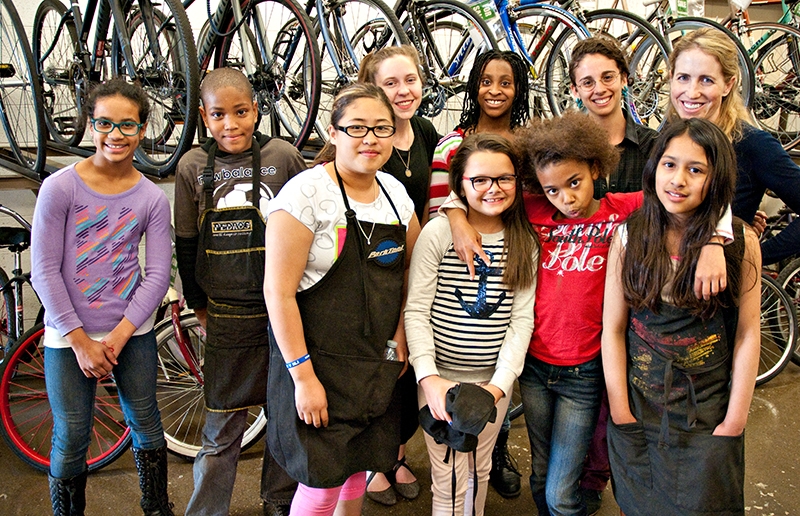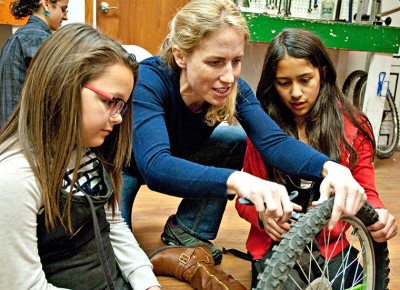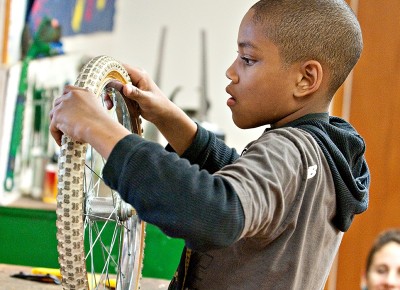Greasy Wrenching for Kids at the SLC Bicycle Collective’s Earn-A-Bike Program
Bike / BMX
Photos: Scott Frederick
The smell of grease filled the air, accompanied by the sounds of exasperated grunts and metal tools manipulating bolts. One of the confounded mechanics struggling to move a rusty bolt silently assessed the situation. Her partner suggested that they needed to lubricate the bolt to get it to move before they realized they were turning the bolt the wrong way. Before long, they had removed the front wheel of the bike that they were working on and quickly patched a hole in the tube. Working in tandem, they joked as they worked through the process as if they’d done it a thousand times, not even discussing the tube, but instead talking about music and boys. This repair duo consisted of two very confident young girls in the fifth grade, and because of the Earn-A-Bike Program at the Salt Lake City Bicycle Collective, these ladies can swing a wrench with the best of them.
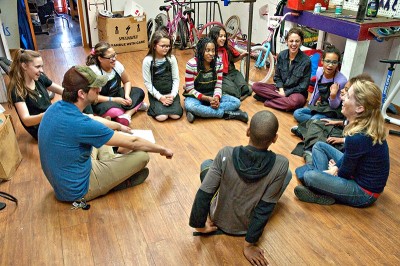
The Bicycle Collective is a full community bike shop with virtually every tool one could ever need to keep a bike up and running. The Collective promotes cycling as a clean and healthy mode of transportation and, according to Catharine Scott, the Coordinator of the Earn-A-Bike Program, teaches kids about the benefits of riding bikes and gives them access and knowledge to fix their own bikes. This sets them up for a future of safe and passionate riding, giving them other skills that they can use in all areas of their lives. “This is a community shop that they invest their time into, learning to work with one another and independently find solutions to problems they encounter,” Scott says. “These are skills that they can use in the future in the work force or to pursue anything they want.”
The Earn-A-Bike Program is open to any youth ages 8–18, and during the span of the free, six-week program, participants will spend their time taking apart and repairing every component of a bicycle. When the program wraps up, each participant gets their pick of any bike in the shop, which they get to take home free of charge, along with a helmet, a patch kit, a lock and the vast understanding of the mechanics of their sweet, new wheels. Graduates of the program also receive a free two-year membership to the Collective, which allows them to work in the shop whenever they need to.
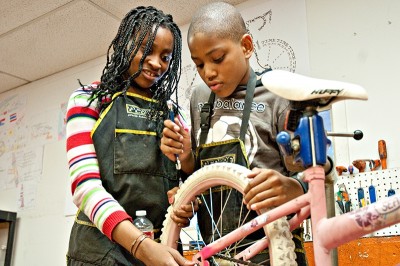
Scott believes that in order to best teach the kids about how to utilize the Collective and understand how to fix their bikes, they have to do a lot of learning on their feet and figure a few things out for themselves. “You’ll break stuff,” she says. “That’s how we learn,” she tells the kids as they work through the bikes. “We live in a culture of kids not doing things on their own. At the Collective, we allow them to learn and make mistakes. That teaches them to ask questions and that it is all right to ask for help.” Scott doesn’t just leave the kids hanging when it comes to tough fixes, though: She asks questions to help guide her students to find the answers themselves.
“The program is so hands-on and engaging,” says Olivea Martin, a group leader for Woodrow Wilson Elementary’s after-school program. “I’ve gotten to watch the kids develop intuitive skills and great understanding in work exchange. This has been a great experiential learning opportunity, and I get to see the students’ confidence come out. At the end of every day, they are working like, ‘I got this.’”
The confidence among the kids in the workshop is clear, and even when one of the kids may be stumped, the overall energy in the shop is positive, and the kids seem eager to help out as they joke around, never acting superior or demeaning to one another.
“Some of the kids come into the program and have very little mechanical experience and might be shy about jumping in, while others have been working with their parents on bike tune-ups,” Scott says of what the kids bring to the program. “Between the kids in the groups, there is already a large knowledge base, allowing them to help each other.”
Diana Marroquin, a fifth-grade participant, says, “You never know when your bike will break. Knowing how to fix my own bike makes me feel smart and prepared.”
Ekere Frank, another fifth grader, says, “The headset was the hardest repair to learn because there are so many parts that you have to keep in order.” Frank’s comment prompted a conversation with Scott on how to best keep the parts of the headset in order, which Frank was able to quickly recite after her own trials.
So rest easy: Whatever uncertainty we may have about the future, we can be sure that our bikes will be in the caring and competent hands of kids growing up understanding, repairing and loving bikes. You can find information on the Earn-A-Bike Program and any other workshops the collective has to offer at bicyclecollective.org.
Click images for captions
